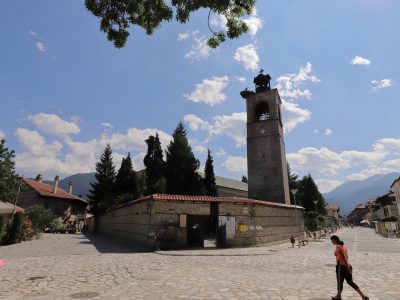With that in mind, when my wife Frances and I found ourselves having some time off work at the same time, we decided to look closer to home.
I’ve never been to the wild and windy moors of Bronte country in West Yorkshire, so it seemed the perfect opportunity to put that right.
It may not exactly be ‘on our own doorstep’ but it’s less than two hours drive by car, so I got online to look for some dog-friendly accommodation as our hound Milo would be coming with us.
After some umming and ahhing, we landed on Delft Nook, a property in a village called Ripponden, near Halifax, which I found on the Airbnb app.
Described as a ‘peaceful woodland cottage in stunning countryside,’ it sounded just like what we were looking for.
After a straightforward booking process – we opted to defer part of the payment until nearer the departure date – and some friendly and helpful advice on how to get there from property host Jill, we were on our way for a three-night stay.
The property is on the edge of Ripponden, a pretty village with what appears to be more than its fair share of pubs (never a bad thing). We were unsure we were heading in the right direction when following a steep, unsurfaced, single-track road, but we needn’t have worried as our home for the next couple of days honed into view.

The property is a beautifully converted office building, with all of the mod cons you would hope for. Small, but perfectly formed, you could say. One bonus for Milo was a small enclosed garden, which meant he could wander outside at will without us having to keep too close an eye on him.
It is surrounded by a woodland, with plenty of tracks to explore, including a lovely riverside walk. It felt like we were in the middle of nowhere – though in reality the village itself was just a short walk away.
After exploring the local area and good night’s sleep, we set off the next day to explore West Yorkshire.
Our first port of call was Hebden Bridge, a pretty market town which has gained a reputation for attracting arty/crafty types – I think the word is bohemian.
We started with a walk alongside the the historic Rochdale Canal, which runs between Manchester and Sowerby Bridge – and very pleasant it is too, After avoiding some stroppy geese, who took understandable exception to the unwelcome visitors on their patch, we enjoyed a pleasant stroll alongside it.

We passed several towering chimneys, remnants of the former textile industry which once dominated towns in this valley. It was to be a recurring feature of our trip. We also spotted a blue plaque hidden away on a house marking the place where the late Ian Curtis, lead singer of Joy Division, once lived.
In fact, we enjoyed our canalside walk so much we hadn’t realised we were heading out of the boundaries of the town on our way to Manchester!
We headed back into town, which is full of brooding and gritty buildings. The town centre has a wonderful array of independent shops and businesses, giving it a genuine artisan feel. I bought some cheese and Frances came away with some ceramic pots.
With time against us, we headed next to the nearby hilltop village of Heptonstall. This small settlement, which overlooks Hebden Bridge, has been described as a hidden gem and West Yorkshire’s best-kept secret. It’s off the tourist trail, so we were keen to explore it – and we weren’t disappointed.
A steep street runs through the centre of the village, surfaced with cobbles reckoned to have been unchanged for 200 years. The cobbled lanes run alongside several well-preserved old buildings and is utterly charming.

Heptonstall’s main draw is the unusual churchyard – one of very few in the country which contains two churches. The older, St Thomas a Becket Church, was virtually destroyed in a great storm in 1847, but rather than demolish it, villagers left it to the elements and wandering around the carefully maintained ruins is both fascinating and slightly eerie.
The churchyard itself is reckoned to contain the graves of 100,000 people – and looking at the way the headstones have been crammed in, sometimes literally on top of each other, it is easy to believe.
But the most famous person buried in Heptonstall is in a different graveyard, a separate plot behind the newer church of St Thomas the Apostle.
The resting place of American poet Sylvia Plath is in the unassuming graveyard, and is still a draw for fans who have left flowers, pens and other tributes where she lies.
Moving on, our next port of call was probably the most famous town in this part of the world – Haworth.
Renowned as the former home of the literary Bronte family, this town is certainly geared up for the many tourists who make a pilgrimage there from all over the world.
The biggest charm of this picturesque town is the main cobbled street – similar to the already mentioned Heptonstall – and its ancient buildings, many of which would be familiar to the Bronets themselves.
No Bronte stone is left unturned here as the many small businesses take full advantage of the town’s famous associations.
One of the most popular draws is the Bronte Parsonage Museum, the former home of the Bronte family which houses many original pieces of furniture, letters, manuscripts and other Bonte ephemera.
But, as we had the hound with us, we gave it a swerve and instead opted for a very nice walk around the beautifully maintained Central Park, with its wide open spaces, bandstand and flower beds – truly a green oasis.
We couldn’t come to Haworth without experiencing at least some of the famous wild and windy moors, which so inspired the literary sisters, most famously in Emily’s Wuthering Heights.
So we headed out on a walk out of town to the ‘Bronte waterfall’. It’s a relatively easy route, the first half of which is largely on a road, followed by a rough track and finally some rougher terrain the closer we got to the famous feature.

The sun came out at this point, allowing us to marvel at the breathtaking scenery – we could see what the fuss was all about.
The waterfall itself wasn’t the most spectacular I’ve ever seen and just how connected to Emily Bronte it is I’m not sure, but no matter, it was well worth the effort.
After clambering up to the Bronte waterfall and pausing on the Bronte bridge, we headed back for a well-earned pint of Bronte ale.
Most read:
We just had time for a quick visit to Halifax to see the unique and beautiful Piece Hall, the oldest remaining Georgian cloth hall in the world, which has been sensitively and superbly restored before our time here was up.
We only had a couple of days in West Yorkshire and there was much more we would have liked to have seen.
But it was a really lovely couple of days and, during the short drive home, we promised ourselves we’d be back.
TRAVEL FACTS
Andrew, Frances and Milo stopped at Delft Nook in Ripponden, West Yorkshire. Two-night minimum stay, prices start from about £70 a night. They booked through the Airbnb website, visit https://www.airbnb.co.uk/ for more details.
For more information on accommodation, places to visit and things to do in West Yorkshire, visit the Welcome To Yorkshire website at https://www.yorkshire.com/
For more information about Haworth and the wider Bronte country, visit https://www.bronte-country.com/
For more about from accommodation, restaurants, shops, pubs, and galleries in Hebden Bridge, visit https://visithebdenbridge.com/
For more information on the history and heritage of The Piece Hall in Halifax, visit https://www.thepiecehall.co.uk/









